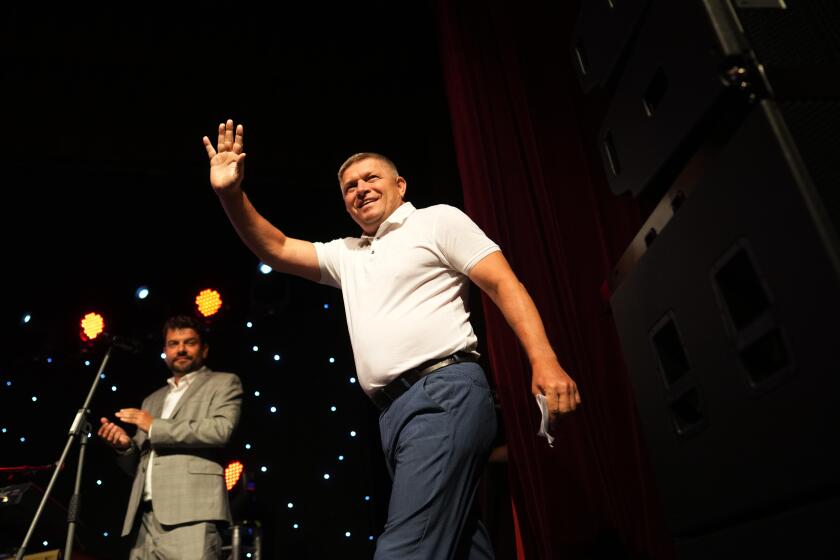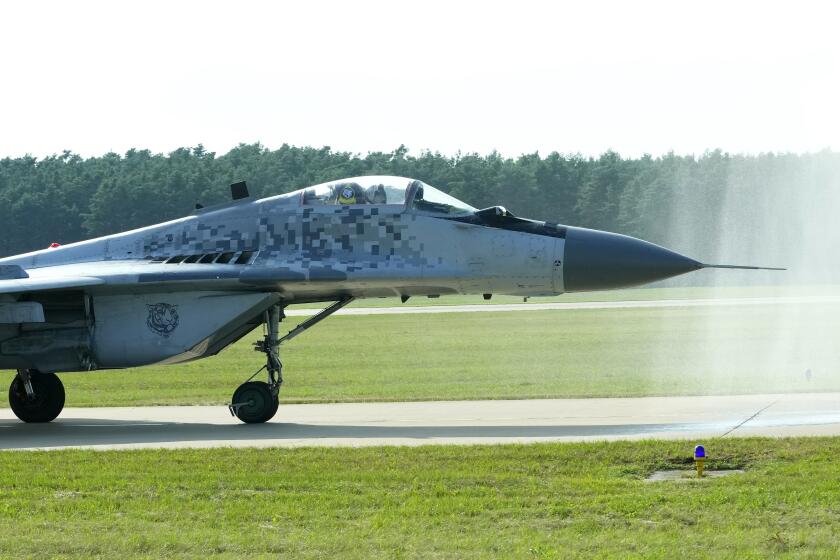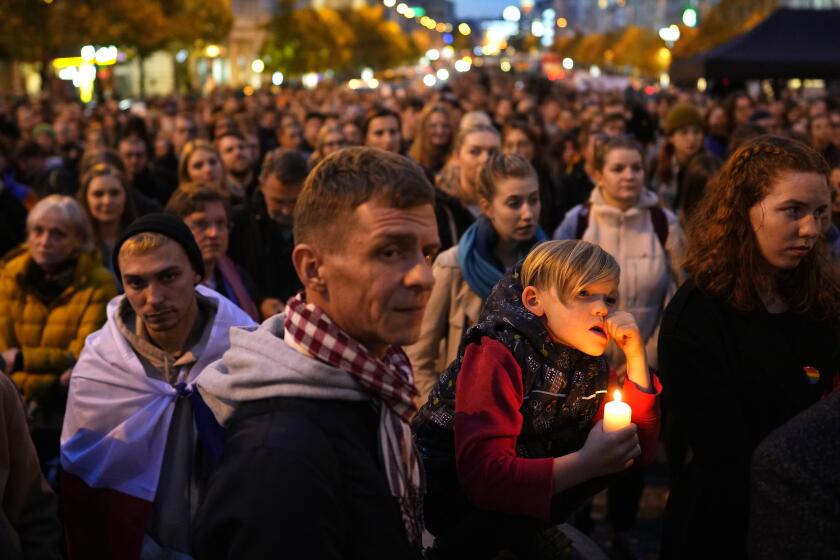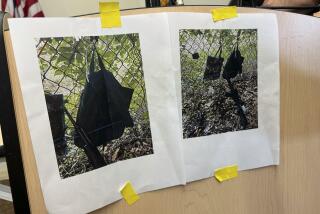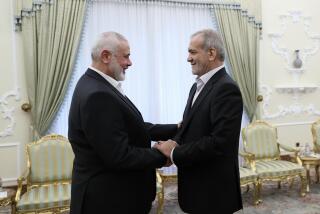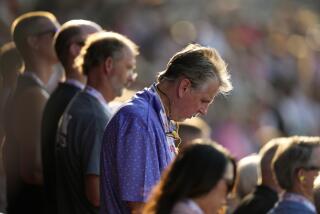‘Lone wolf’ charged in assassination attempt on Slovak prime minister
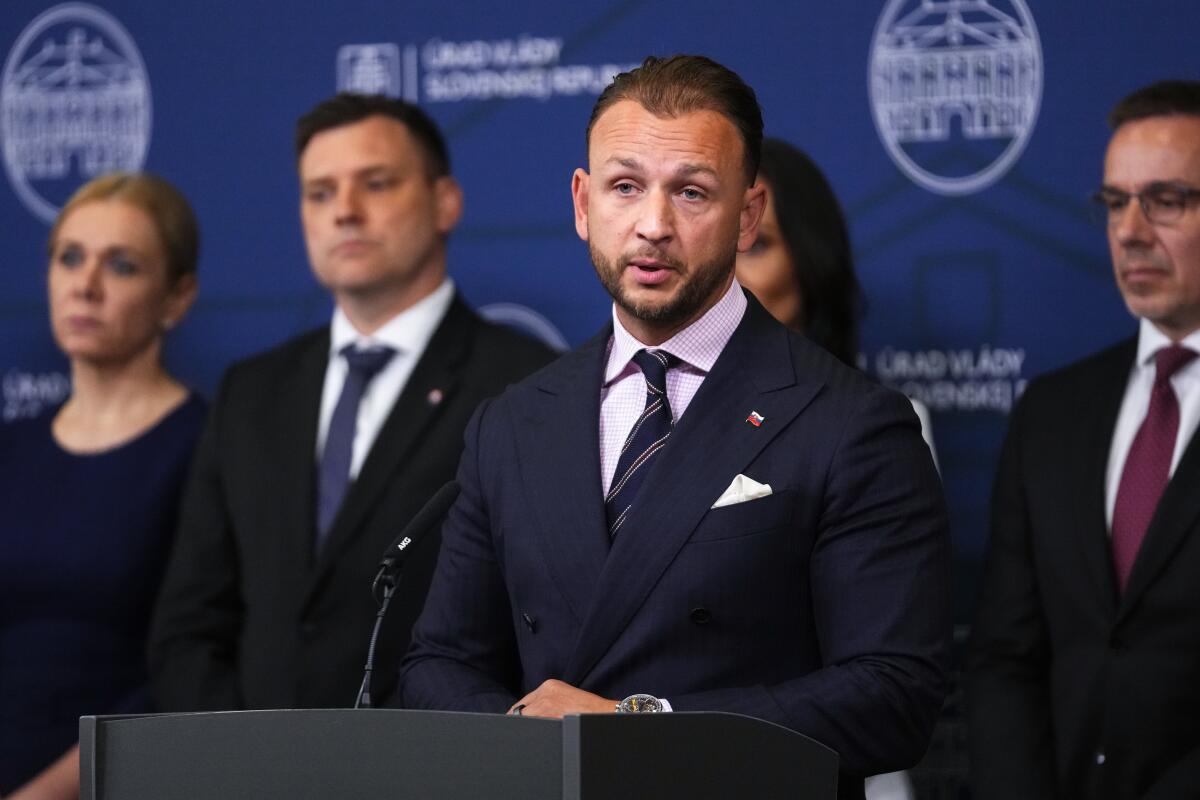
BANSKA BYSTRICA, Slovakia — Slovak authorities charged a man Thursday with attempting to assassinate Prime Minister Robert Fico, saying he acted alone in a politically motivated attack. Fico’s pro-Russia views have contributed to deep divisions in the small European country that borders Ukraine.
Fico, 59, was in serious but stable condition a day after being shot multiple times, a hospital official said. President-elect Peter Pellegrini said he spoke to Fico at the hospital and confirmed his condition “remains very serious.”
The attempted assassination of Fico has shocked the nation and reverberated across the continent weeks ahead of European elections. While Pelligrini and outgoing President Zuzana Caputova urged people to dial back the sharp rhetoric that has characterized the political debate, some Fico supporters accused Slovakia’s news media of contributing to the polarization.
Interior Minister Matus Sutaj Estok asked journalists to “reflect” on how they had covered Fico’s policies. He referred to the suspect — who was charged with premeditated murder — as a “lone wolf” who did not belong to any political groups, though he said the attack itself was politically motivated.
Slovakia’s populist prime minister, Robert Fico, was shot multiple times in an assassination attempt, shocking Europe before elections.
“I can confirm that this person is not a member of any right-wing or left-wing radicalized party,” Estok said.
Fico has long been a divisive figure in Slovakia and beyond, and his return to power last year on a pro-Russian, anti-American message led to even greater worries among fellow European Union and NATO members that he would abandon his country’s pro-Western course — particularly on Ukraine.
At the start of Russia’s invasion, Slovakia was one of Ukraine’s staunchest supporters. Fico halted arms deliveries to Ukraine when he returned to power, his fourth time serving as prime minister.
Fico’s government has also made efforts to overhaul public broadcasting — a move critics said would result in the government’s full control of public television and radio. That, coupled with his plans to amend the penal code to eliminate a special anti-graft prosecutor, have led opponents to worry that Fico will lead Slovakia down a more autocratic path.
A populist former prime minister whose party is favored to win Slovakia’s parliamentary election wants to reverse the country’s support for Ukraine.
Thousands of demonstrators have repeatedly rallied in the capital and around the country of 5.4 million to protest his policies.
Slovak police have provided little information on the identity of the suspect. But unconfirmed media reports suggested he was a 71-year-old retiree who was known as an amateur poet, and may have previously worked as a security guard at a mall in the country’s southwest.
At a news conference Thursday after a meeting of Slovakia’s Security Council, government ministers gave more details about the man, while still not naming him.
Estok said the suspect cited his dissatisfaction with several of Fico’s policies as motivation for the attack. The minister said that the recent presidential elections prompted the assault, and that the suspect had attended a recent anti-government protest.
“I can confirm to you that the reason it was a politically motivated, attempted premeditated murder is as the suspect himself said: the media information that he had at his disposal,” he said. “I think each of you can reflect on the way you presented it.”
A visitor encounters a centuries-old castle, whimsical street art, a performance of ‘Carmen,’ Old Town cafes and pop music-loving locals.
At the same news conference, Deputy Prime Minister Robert Kalinak also blamed the media for tensions in the country.
The tenor of those remarks stood in contrast to a news conference earlier in the day when the country’s outgoing and next presidents — political rivals — appeared together in an appeal for Slovaks to overcome their political differences.
“Let us step out of the vicious circle of hatred and mutual accusations,” said Caputova, the departing president and a rival of Fico’s.
Pellegrini, who assumes the presidency next month, called on political parties to suspend or scale back their campaigns for European elections, which will be held June 6-9.
“If there is anything that the people of Slovakia urgently need today, it is at least basic agreement and unity among the Slovak political representation. And if not consensus, then please, at least civilized ways of discussing among each other,” Pelligrini said.
Fico said last month on Facebook that he believed rising tensions in the country could lead to the murder of politicians, and he blamed the media for fueling tensions.
Slovakia’s government has approved a plan to give Ukraine its fleet of 13 Soviet-era MiG-29 fighter jets, joining Poland in offering Kyiv warplanes.
Grigorij Meseznikov, a political scientist who heads the Institute for Public Affairs think tank in Bratislava, the Slovak capital, said he disagreed that the media played any role in inciting violence against Fico. “We have very good and independent media in Slovakia,” he said. “The media is doing its job.”
Before Fico returned to power last year, many of his political and business associates were the focus of police investigations, and dozens have been charged.
His plan to overhaul the penal system would eliminate the office of the special prosecutor that deals with organized crime, corruption and extremism.
Zuzana Eliasova, a resident of Bratislava, said the attack on Fico was a “shock” to the nation and an attack on democracy.
“I believe that a lot of people or even the whole society will look into their conscience, because the polarization here has been huge among all different parts of society,” she said.
Doctors performed a five-hour operation on Fico, who was initially reported to be in life-threatening condition, according to the director of the F.D. Roosevelt University Hospital in Banska Bystrica, Miriam Lapunikova. He is being treated in an intensive care unit.
Thousands have rallied in Prague to honor two Slovak gay men shot dead this month outside a bar in Slovakia, and demanded better protection of LGBTQ people and their families.
Five shots were fired as Fico was greeting supporters at an event Wednesday in the former coal mining town of Handlova, nearly 85 miles northeast of the capital, government officials said.
Fico assumed power in October for the first time since 2018, when his third term as prime minister ended.
He and his Smer party have often been described as left-populist, though he has also been compared to politicians on the far right, including the nationalist prime minister of neighboring Hungary, Viktor Orban.
Condemnation of the attack came from both Fico’s allies and adversaries abroad.
On Wednesday, Russian President Vladimir Putin sent a message to President Caputova, expressing his support and wishing the prime minister a fast and full recovery.
“This atrocious crime cannot be justified,” Putin said in the message released by the Kremlin. “I know Robert Fico as a courageous and strong-willed person. I truly hope these personal qualities will help him overcome this harsh situation.”
Ukrainian President Volodymyr Zelensky also denounced the violence against a neighboring country’s head of government.
“Every effort should be made to ensure that violence does not become the norm in any country, form or sphere,” he said.
Associated Press writers Szandelszky reported from Banska Bystrica and Josef and Jenne from Bratislava. AP journalists Jan Gebert in Banska Bystrica, Karel Janicek in Prague and Vanessa Gera in Warsaw contributed to this report.
More to Read
Sign up for Essential California
The most important California stories and recommendations in your inbox every morning.
You may occasionally receive promotional content from the Los Angeles Times.

